Content Sections
On being diagnosed with cancer, the last thing anyone wants, or needs, is to feel like he or she is being herded onto a treatment conveyor belt with little or no information or treatment choices. Treatment choices that involve personalised lifestyle intervention or more controversially, integrative or complementary therapy approaches, are often not even on the menu.
Cancer patients at their most vulnerable time are all too often the losers, caught up in the crossfire between conventional cancer care and the more individualised integrative and lifestyle approaches. A few brave souls manage to step off the conveyor, fight for time to think, investigate their options and continue their ‘conversation’. However, confused and frightened, often subject to fear-induced family pressure too, the majority follow the guidance of their mainstream oncologist.
This year’s annual Yes to Life Conference on Saturday 25 November 2017 at Mary Ward House in Central London asked the crucial question: “Could this treatment help me?” It’s a question many patients find impossible to answer given the speed at which current cancer treatments are implemented and even forced upon them. Rather than being able to talk calmly to practitioners on both sides of the cancer debate, patients find themselves in the no man’s land between practitioners intent on promoting their own agenda and discrediting all other options.
Principle 4 of the NHS Constitution states services should be “coordinated around and tailored to, the needs and preferences of patients”. When it comes to cancer this is very rarely happening. Patients are bullied and railroaded into accepting treatment that is either marginally effective, but commonly ineffective and highly damaging likely to accelerate death! Things need to change and sooner rather than later and it’s largely going to be down to patients and their loved ones to demand that change.
Starting the dialogue and leading from the front
Dr Rangan Chatterjee
More and more doctors are realising the limitations of their training in dealing adequately with chronic disease. Dr Chatterjee, of BBC’s Doctor in the House fame, is part of a team working to break down the barriers preventing doctors from prescribing lifestyle and functional medicine. It is a coup of some note that Dr Chatterjee and his team have managed to pull off the impossible – having a one day introduction to prescribing lifestyle medicine course approved for professional credits by the Royal College of GPs. The Prescribing Lifestyle Medicine course will run for the first time this January in London and is designed to give NHS doctors the confidence and skills they need to use lifestyle medicine. Rather than being patient-centred, mainstream medicine is becoming more and more protocol driven to the detriment of the patient. Doctors need to “change their conversation” with patients – placing emphasis on the essential role that diet and lifestyle change plays in healing the body. He believes it’s critical to break down the barriers between conventional medicine and other disciplines to have a truly successful and effective healthcare system. Dr Chatterjee underlined that we – doctors, practitioners and patients alike – should be embracing all appropriate interventions. As long it works – do it!
Dr Rupy Aujla
Rupy's overriding mission? To teach doctors and their patients to cook. Having suffered his own health issues, Rupy turned to diet and lifestyle interventions to resolve them. Anyone who's had any time with Dr Aujla of late will know he's properly got his health back - along with insatiable vitality! In his forthcoming book named after his blog, The Doctor’s Kitchen (out 28 Dec and available for pre-order), he shows how to supercharge your health with delicious, everyday recipes. His book, blog site, regular podcasts, community cook-ins and presentations demonstrate that lifestyle medicine isn’t radical. But it is both efficaceous and cost effective and should be a first line intervention for all patients with chronic disease. Taking the model developed at Tulane Medical School in the US, Dr Aujla is bringing ‘Food as Medicine’ to UK medical students. The aim being to give doctors more confidence to talk to patients about alternatives to medication and open up possibilities for integrative care. In the long-term he is hell bent on making sure that community kitchens affiliated with all GP surgeries are commonplace, where everyone can learn how to take steps to reduce their risk of developing chronic diseases.
Dr Malcolm Kendrick
A conventional NHS GP with an unconventional viewpoint attempting – and succeeding – to keep a foot in both camps! Dr Kendrick believes sun exposure is essential for good health, most cancer screening is bad for you and vaccination is not a good thing for some children. He posed the question, “Why is it impossible to have a dialogue about cancer treatments with the NHS and what needs to be done to progress matters?”. Mainstream medicine continues to worship at the altar of peer reviewed science, but he believes, as we do at ANH-Intl, that the traditional RCT model doesn’t work for complementary, integrative or natural medicine. His advice? Talk to your doctor as an equal, take control and talk to him or her about what you, as a patient want. Be firm about your desire to create a meaningful dialogue.
Prof Robert Thomas, Oncologist (Cancernet UK)
Prof Thomas is a fully fledged oncologist who conducts trials, working to find ways to naturally reduce inflammation in our bodies to reduce the risks of developing chronic disease, including cancer. He shared his work with phytonutrients and their essential role in a patient’s recovery from cancer. Despite recent reports that sugar does not fuel cancer he warned of its ability to drive insulin resistance, which can increase your risk of cancer. His advice? Eat a wide range of phytochemicals to promote a healthy gut microbiome, which in turn can improve cancer treatment outcomes.
“There is hope, there is a chance you can alter your destiny. People feel good when they use lifestyle interventions” – Prof Robert Thomas
A patient’s perspective
Sophie Sabbage – The Cancer Whisperer
Sophie Sabbage has Stage 4 cancer. She wasn’t due to see Christmas this year, but is lucky to be working with an oncologist who is willing to converse and work with her whilst she tries different treatments. Sophie will almost certainly now celebrate Christmas with her family. She spoke about cancer treatment from a patient’s perspective. Conventional and complementary practitioners need to come together, shake hands and stop “dissing” each other, to create a dialogue that has only the patients’ best interests at heart. She made a case for the importance of ensuring that patients are heard when they want to try something different and supported in their wishes. Patients should not have to fight a battle about their treatment alongside the fight for their life.
Her own personal view of her journey is that, “You have terrorists in your house. Surgery, chemo and radiotherapy are the SAS. The rest of us are taking care of the building, the land and the garden. The best kind of teamwork”.
ANH-Intl teamwork continued the conversation
Racing across London from a presentation to elite and Olympic athletes at the Rising Health conference, ANH-Intl founder, executive and scientific director, Rob Verkerk PhD, discussed how keto-adaptation and dietary diversity holds the keys to cancer prevention — and good health. These are not new states or related to any fad - this is about our evolutionary norm - that we badly neglect in the modern, industrialised world. The current government nutritional guidelines are a disaster for our health and could be considered a “diabesity plate” that makes people more susceptible to cancer. To become more metabolically resilient and physiologically flexible, we need to become keto-adapted, a 'normal', yet still uncommon, metabolic state in which we burn fats to produce ketone bodies for energy in the absence of carbohydrates. Rob broke the ANH’s Food4Health guidelines into bite-sized, practical chunks and explained why eating a low carb, higher fat, moderate protein, phytonutrient-dense diet was cancer protective. Key is the inclusion of a diverse range of plant foods to benefit from the multitude of phytochemicals that act as essential co-factors and signalling molecules for our bodies 135+ metabolic pathways. It’s Nature’s medicine and it’s powerful. It’s not all about food though. How much and when you eat; how you move, sleep and relax are all essential for a total disease-prevention strategy. Imperative in any disease transformation process, is how we detoxify our lives and manage stress, which is why having a meaningful purpose in your life is very much a part of the prescription. Supplements - or concentrated sources of nutrients - as well as fresh herbs and spices - can also play an important part in these regimes.
Meleni Aldridge, ANH-Intl executive coordinator, presented on what healthcare looks like through a functional medicine lens. “If your tap leaks, you find a plumber to fix it, you don’t just mop the floor”. From its systems biology approach, functional medicine is the diametric opposite to a 'floor mopper', it's your quintessential ‘health plumber’. The functional approach roots out the cause(s) by taking a patient’s history and by looking at how function follows form through the way in which physiological systems express their dysfunction. Central to the functional medicine model is an individual’s mental, emotional and spiritual wellbeing, something that is rarely considered in mainstream medicine, let alone for cancer patients. Food is medicine, food is information, which is why making dietary changes can have such huge impacts on our ability to prevent and resolve disease. Lifestyle changes are also an essential part of the functional prescription, which also asks each patient, “What do you need to thrive?” and then seeks to support them in regaining vital territory.
More grist for ‘the conversation’ mill
The rest of the afternoon’s speakers offered a range of interventions that should be offered as a part of every cancer patient’s individual plan to help them resolve their disease. Lizzy Davis shared the power of exercise; Claudia Manchanda spoke about the power of herbal medicine; Liz Butler described using nutritional therapy to create an environment that is hostile to cancer; Dr Catherine Zollman elaborated on Penny Brohn’s whole-life approach and how it’s helping people reconnect with themselves; Dr Damien Downing called on more doctors to join the British Society for Integrated Oncology, while Mark Boscher spoke about the benefits of oxygen therapy.
The resounding message from a very successful day was that far from being pushed ignominiously into the shadows, lifestyle and integrative medicine is on an unstoppable rise in popularity, its ascent being promoted by patients and health professionals alike. All that’s needed now is for there to be a stable bridge over the healthcare divide that patients can use to traverse their own journey to health and healing.
For anyone interested in a copy of the slides presented on the day, please email Yes to Life at [email protected].




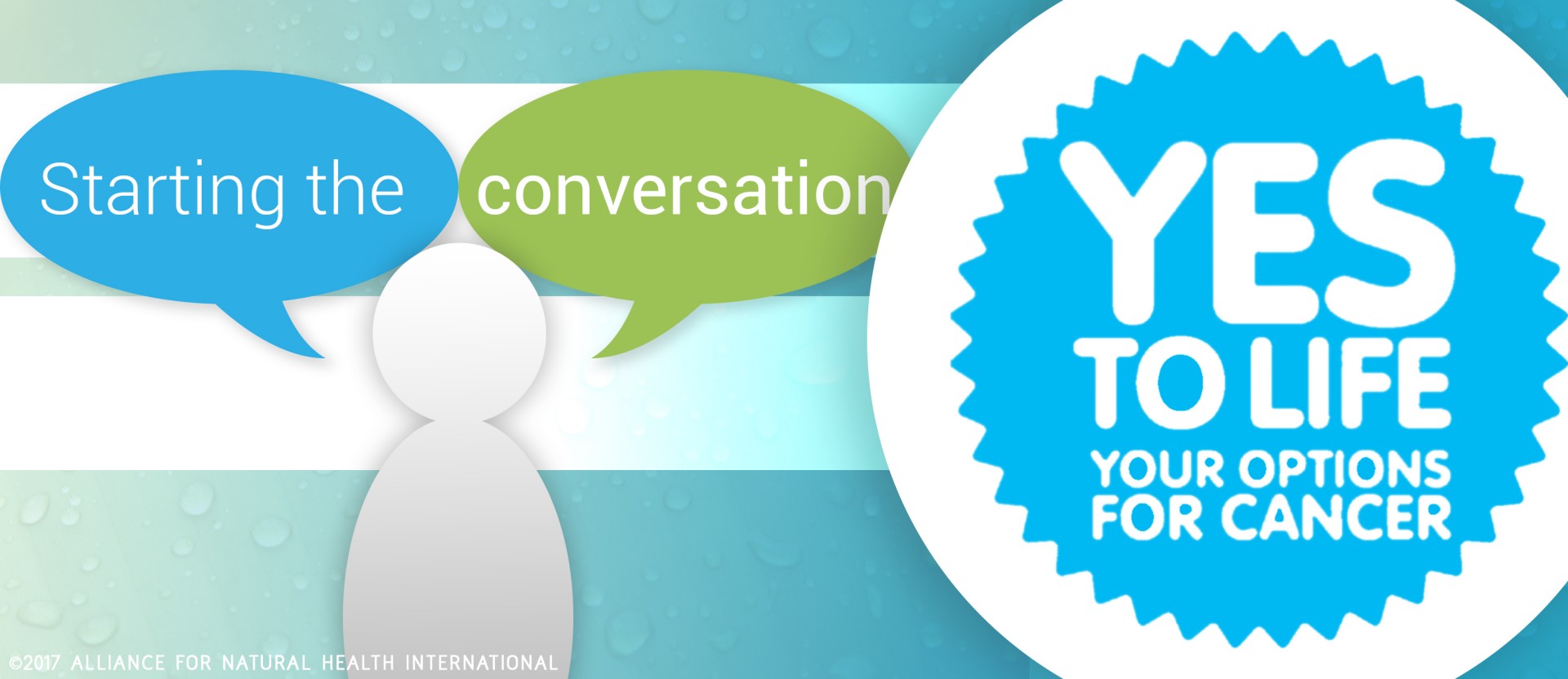
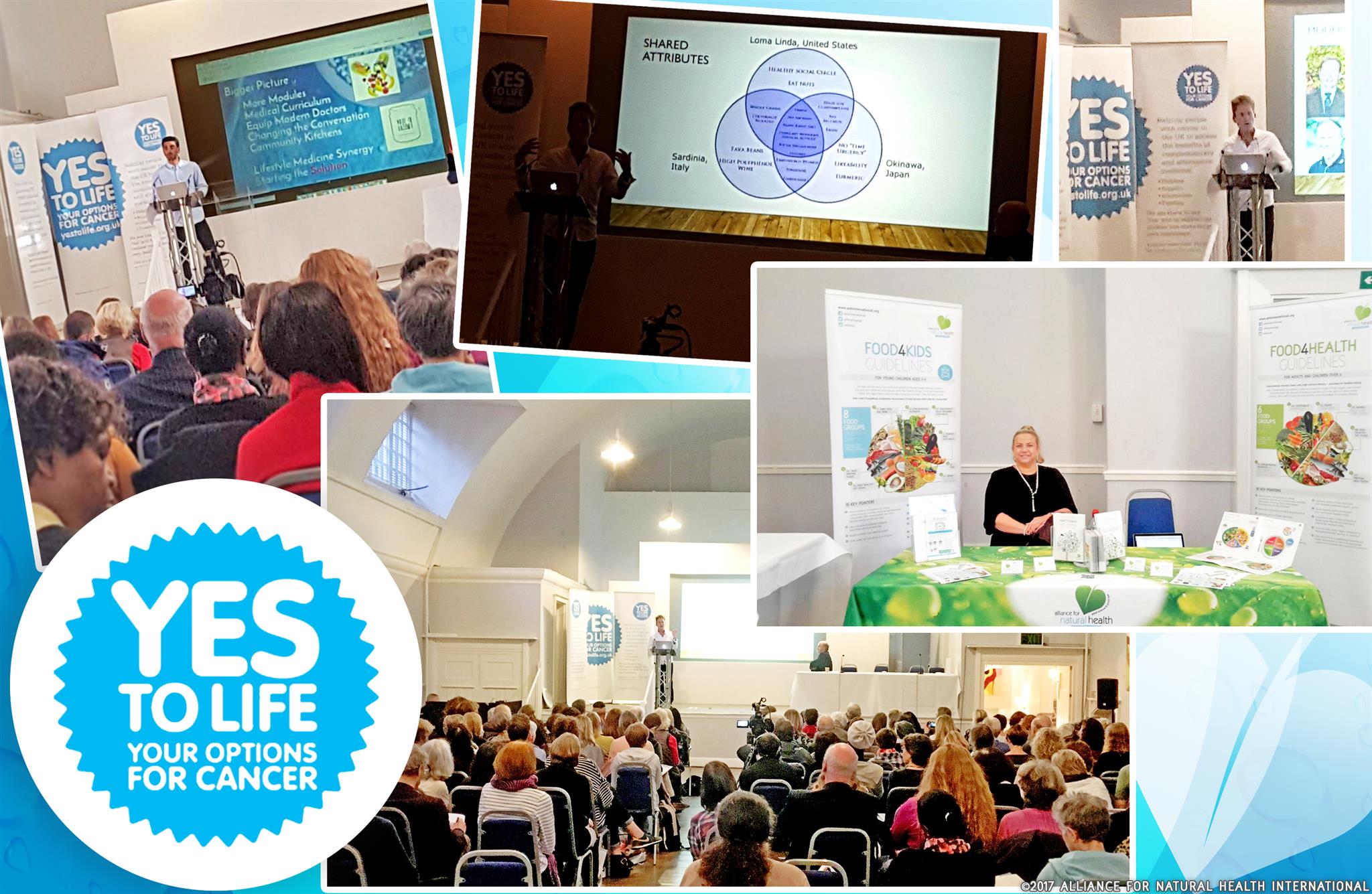
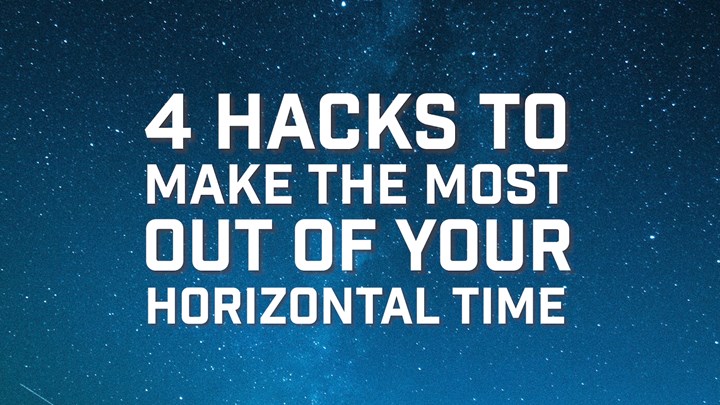
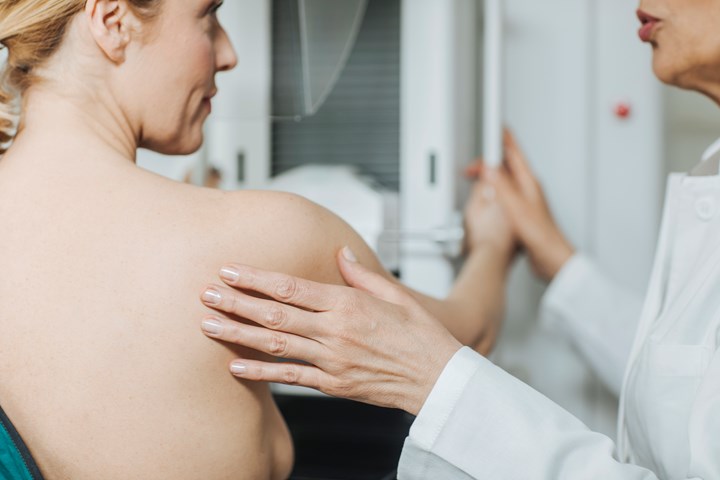
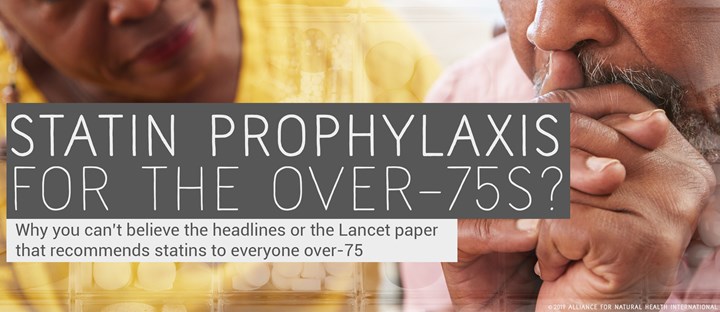
Comments
your voice counts
30 November 2017 at 8:57 am
Excellent article though I was confused by the ‘floor-mopper’ analogy. I’m familiar with the cartoon depicting men in white coats (representing conventional medicine doctors) mopping up the floor, while no one thinks to turn the taps off (or fix the leak). Isn’t Functional Medicine better represented by the plumber, who comes in to fix the leak/turn the taps off rather than merely mopping up the floor? Yes, of course, the floor still needs to be mopped up, but it’s not the main point here, or am I missing something? Some clarity on this analogy could be helpful.
30 November 2017 at 12:34 pm
Bless you Isabella, you are completely right! And that's exactly what I presented on Saturday, that rather than just being a 'floor mopper', Functional Medicine is the 'plumber' when it comes to health. We've made the change in the article and so appreciate your eagle eye on this :-) The perils of being a small and exceptionally busy team...
Warmly,
Meleni
30 November 2017 at 10:34 am
Thanks to all the ANH team - this is a fantastic round up of the day. It was great to have you all there as part of the movement. We are excited that, with the growing number of people understanding the benefits of a whole person approach to treating people with cancer, together with the initiatives demonstrated by those speaking at the event, change will come and with some hope thrown in, a little more quickly.
Thanks again
Yes to Life Team
30 November 2017 at 12:14 pm
Thank you Sue, the team that was there on day really enjoyed the conference too. Best regards ANH Team.
01 December 2017 at 12:00 pm
Congratulations on this wonderful resume, calmly put whilst still portraying a passion so obviously felt. This is hard to do as an individual who has seen many close family and friends bullied, tortured and left in their final months or years with virtually no quality of life due to extensive barbaric treatments, doled out by an industry who knows better but is too greedy to care. I myself was wrongly diagnosed and pressured to have surgery and treatment which would have changed my life completely. Thank god for my gut feeling, my hatred for conventional treatments and for having a dear friend who is a surgeon who arranged extensive tests which showed nothing abnormal. Thank your for your articles and for sharing your knowledge with us.
Your voice counts
We welcome your comments and are very interested in your point of view, but we ask that you keep them relevant to the article, that they be civil and without commercial links. All comments are moderated prior to being published. We reserve the right to edit or not publish comments that we consider abusive or offensive.
There is extra content here from a third party provider. You will be unable to see this content unless you agree to allow Content Cookies. Cookie Preferences